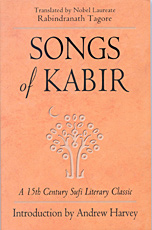In his introduction to this new edition of the classic collection of poems, Andrew Harvey (The Direct Path) places Kabir alongside Jesus, Rumi, Ramakrishna, and Aurobindo as “spiritual geniuses whose realization transcends all barriers of dogma, religion, country and civilization.” This fifteenth century weaver was born into a Muslim family (his name means “great”) but grew up to practice a mystical devotional life that was beyond labels or religious classification. These poems, translated into English by the great Indian poet Rabindranath Tagore, were first published in 1915.
While other spiritual seekers talk about pilgrimages or quests that take them far from home, Kabir savors the place of our roots as a fond source for inner growth. As he puts it in one poem, “The home is the abiding place; in the home is reality; the home helps to attain Him Who is real. So stay where you are, and all things shall come to you in time.” Good advice, especially in this era of global disarray.
Whereas other religious poets try to offer descriptions and definitions of the Holy One, Kabir always resists: “The conscious and the unconscious, both are His footstools. / He is neither manifest nor hidden, He is neither revealed nor unrevealed; / There are no words to tell that which He is.” The true mystic always is reduced to silence in the face of the Unknowable One, and Kabir stands humbly in that circle.
In other poems, he assembles a bouquet of words to salute the playfulness of the Creator and the “Eternal Spirit” of Creation. He rejoices in his communal intimacy with the Divine Friend and Lover. Again and again, Kabir turns to the metaphor of music to convey the rapture and enthusiasm of his heart in a world permeated with grace.
